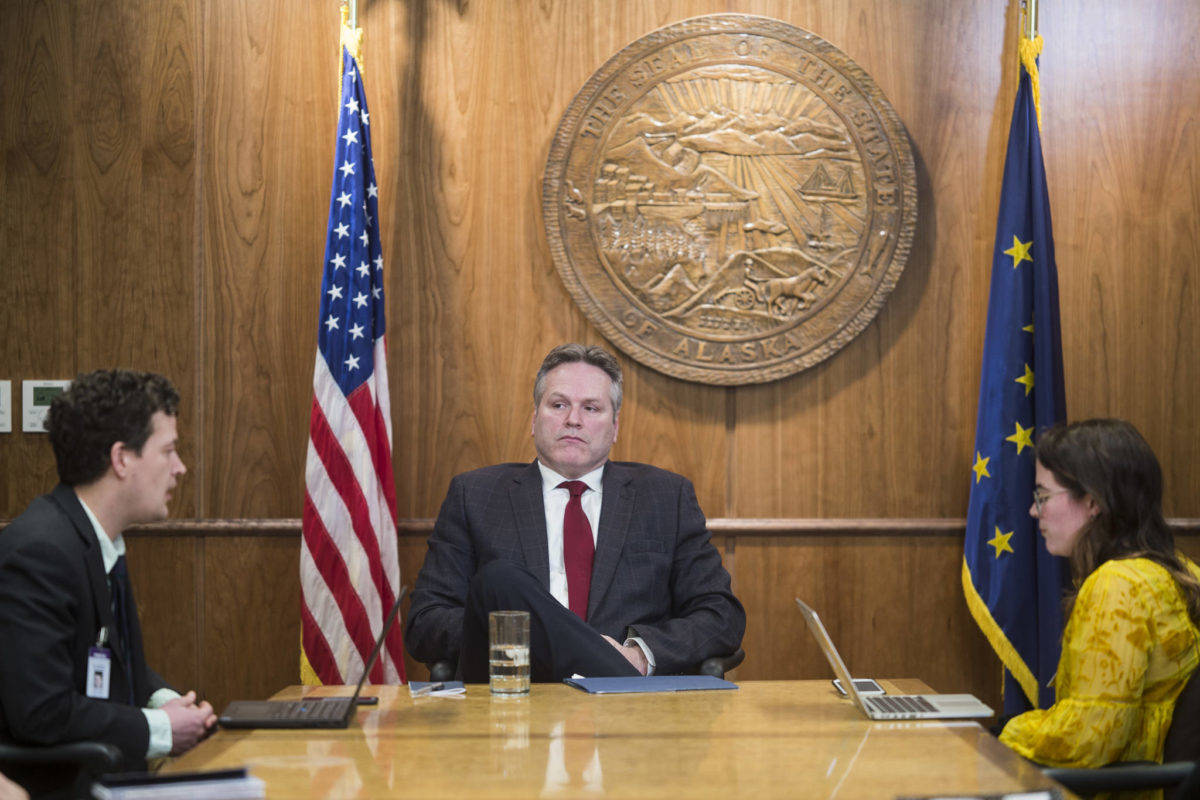Summary: While the governor lauded this particular legislation as a step forward for Alaska after a long legislative session, many of the programs whose accounts were emptied by the sweep had never been part of that process. The Alaska Performance Scholarship and Power Cost Equalization had never been part of the sweep before Dunleavy’s administration.
The governor has ended his press conference.
2:50 p.m.
“For a variety of reasons we’re not going to be taking questions today,” says Matt Shuckerow, director of communications for the office of the governor.
Dunleavy is now thanking people for working on the capital budget.
“This bill is now law,” he says.
His administration will be taking action that will have a huge impact for a large number of Alaskans in the near future (potentially referring to HB 2001 which is yet to be signed and contains language for the PFD).
Dunleavy says that his cuts were meant in part to begin a conversation in Alaska about the budget and that talk has started and continues to this day.
The intent of the vetoes was not to harm Alaskans, “nothing could be further from the truth,” he said. Acting as if the state was not running a budget deficit was doing harm to Alaskans. He says that many Alaskans have personally thanked him for taking action on the budget despite the difficulties the cuts would cause for many groups.
He talks about how the price of oil dropped, causing the state to lose a large source of its revenue.
Restore and protect the PFD, promote public safety, and put the state on a plan for fiscal sustainability, is what the governor said he ran on.
The governor begins by talking about Sen. Chris Birch, R-Anchorage, who passed away suddenly Wednesday from a heart attack at the age of 68.
2:40 p.m.
The governor will be signing the SB 2002 at the offices of the Associated General Contractors of Alaska in Anchorage. According to a press release from the governor’s office the bill, “properly captures nearly $1 billion in federal transportation and infrastructure funding, provides necessary resources to enact public safety legislation, and reinstates funding for various programs such as the Alaska Performance Scholarship, WWAMI and Power Cost Equalization.”
WWAMI is the University of Washington’s multi-state medical education program, the acronym stands for Washington, Wyoming, Alaska, Idaho and Montana.
2:30 p.m.
Governor Mike Dunleavy is signing one of the two bills to come out of the special session, Senate Bill 2002. That bill contains appropriations for a working capital budget and contains language to reverse “the sweep.”
The governor has the ability to line-item veto items from the budget as he did in the past, but he cannot alter the reversal of the sweep. The governor’s office has not said if anything in the bill will be vetoed but did say in a previous press release that while Dunleavy intends to sign the bill into law he will exercise his veto authority, “where necessary.”
Reversing the sweep will provide money to the accounts which fund the Alaska Performance Scholarship and the Power Cost Equalization program, among other state programs.
SB 2002 passed through the House and Senate after two very contentious special sessions which saw the legislature deeply split over state funding, among other issues.
At one point the legislature was physically divided, with a number of legislators gathered in Wasilla per the order of the governor. The majority of lawmakers, claiming the governor had no right to make such an order, remained in Juneau. Neither side had enough votes to conduct any meaningful business and lawsuits have been filed against both sides, the governor on one and Senate President Cathy Giessel, R-Anchorage, and House Speaker Bryce Edgmon, I-Dillingham, on the other.
Dunleavy has another bill that requires action on his desk, HB 2001. That bill contains money for an operating budget and allocates a Permanent Fund Dividend. However, the amount for the PFD in that bill is only $1,600 and the governor has repeatedly expressed his preference for a full $3,000 dividend payment.
The governor has until Thursday, August 29, to either sign, veto or allow that bill to pass into law without signature. His office has said that the governor considers the budget for the 2020 fiscal year to be, “largely settled,” but the possibility of veto remains.

